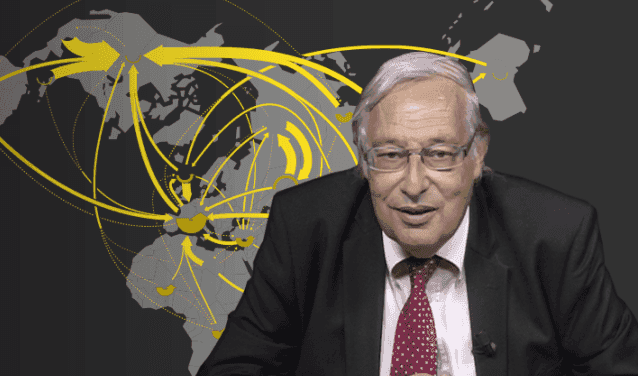Home>Bertrand Badie’s “Espace Mondial”: A MOOC for a Global View

03.04.2020
Bertrand Badie’s “Espace Mondial”: A MOOC for a Global View
Updated 1 April 2020: Ideas aren’t under lockdown! All our MOOCS are available on Coursera, including Bertrand Badie’s indispensable and popular course, “Espace Mondial”. #KeepLearning
22,000 fans: that’s more than a Beyoncé concert at the Bercy arena in Paris. It’s also the number of people who have taken Bertrand Badie’s online class since 2014. From a small village in Morocco to La Réunion island and Mexico, whether in an office or on a couch, while doing laundry or cooking a meal, students of all ages and from all over the world all acclaim Bertrand Badie’s MOOC, “Espace mondial”. And, fortunately for non-French speakers, the course is back, by popular demand, on Coursera with a new international and multilingual version.
In January 2014, Bertrand Badie, Professor of International Relations at Sciences Po, was lecturing at a somewhat unusual podium: for the first time, his course “Espace mondial” became open to everybody, for free, and easily accessible on the platform France Université Numérique (FUN). Two versions later, his classes have travelled all over the world and reached 22,000 online students between 15 and 85 years of age. This first edition was an important step in spreading Sciences Po knowledge, but an ever bigger one was made on June 3rd, 2019, with the opening of the international version of the course on the American platform Coursera.
Delivered in English and with subtitles available in Arabic, Mandarin, French, Portuguese, and Spanish, this new cycle of “Espace mondial” is now accessible to an even wider audience than that of the first edition, which was already diverse, with nearly 15% of students signing in from countries other than France.
Available on demand and in 6 languages
In Mexico, Brazil, Morocco, Senegal, Chile, Madagascar, China and the USA… As well as in the Var, rural Aquitaine, the village of Sausset-les-Pins and New Caledonia: the enthusiastic reviews from virtual students map out a “community of intellectual interest” - as one student put it - without borders. Similarly, the new edition represents a lifting of language barriers for students who are not fluent in French: “I’m Filipina and I don’t speak a high level of French,” says one student, “but thanks to the subtitles and the worksheets I was able to understand and improve my French as well as my understandings of the global space!”
With the new multilingual edition on Coursera, the MOOC is able to go further in what another student calls “the global space of knowledge”, a field that does away with class, age, and societal distinctions. The testimonies combine the voices of a 56-year-old former farmer, a student from the Ivory Coast, a psychologist, an engineer, a textile designer, and a retiree delighted to be “returning to the classroom” that he “left when he was 16 to work in a factory.”
A course declared “of public interest” by 22,000 virtual students
“I finally feel like I can better understand our world and its mechanisms.” “Bertrand Badie has sharpened my perspective.” “Your lessons help us maintain a certain critical approach towards current events.”: despite their differences, these users share, with an immense intellectual satisfaction, their gratitude for having been able to access this “exciting and addictive” “public-interest course”, to use one student’s description.
Already a great number of students have reported listening to the classes again, “at night, when the whole house is sleeping”, “while doing the housework”, or “first thing in the morning before going to work”. For old and new followers of “Espace mondial” alike, the new version in English available on Coursera offers more flexibility: with a shorter format that is available on demand, all sessions are available at the same time: students can move through the course as and when it works for them. Another benefit of the new version is the addition of over 200 maps, diagrams and photos to accompany the 9 hours of video material, as well as a many texts, multiple choice quizzes, and discussion forums.
“This geography-history class combining philosophy, law, and human sciences is a real lesson in humanity, and I feel it should be spread around the world immediately”, said one student, whose wishes have now come true on Coursera!
Find out more